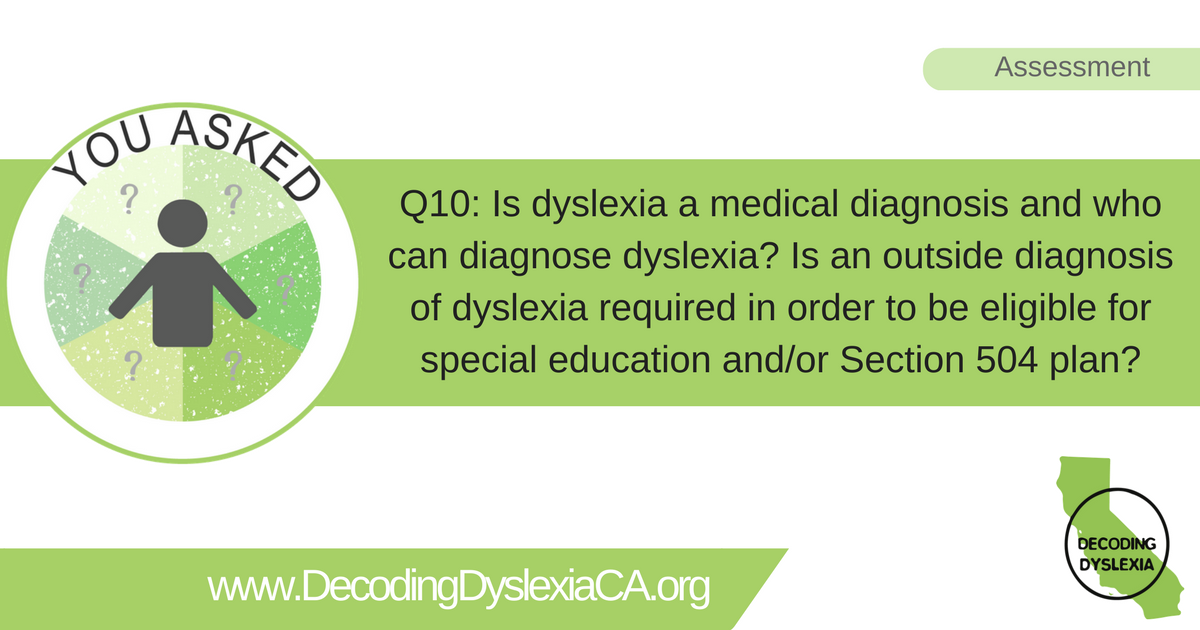Download a PDF version of this You Asked question and answer here.
Q10: Is dyslexia a medical diagnosis and who can diagnose dyslexia? Is an outside diagnosis of dyslexia required in order to be eligible for special education and/or Section 504 plan?
A: Dyslexia is not characterized as a medical problem and is not typically diagnosed by doctors because they don’t have training in oral language, reading, writing, or spelling assessment and diagnosis. That being said, developmental pediatricians, psychiatrists, licensed psychologists (Ph.D. or Psy. D.) and neuropsychologists have additional training in cognition and learning and some have expertise in the clinical and neurobiological features of dyslexia. (Source: Debunking the Myths about Dyslexia – University of Michigan Dyslexia Help Center)
The Diagnostic and Statistical Manual of Mental Disorders (DSM-5) published by the American Psychiatric Association is the official list of mental disorders. A dyslexia diagnosis under the DSM-5 can be referred to as a “specific learning disorder with impairment in reading” or dyslexia can be used as an alternative term. Diagnosis under the DSM-5 can be made by mental health and other health professionals as determined by the licensing laws in California. It is important as a parent when selecting a mental health or other health professional that they have the requisite experience in assessing dyslexia. (Source: American Psychiatry Association)
An outside diagnosis is not required to be eligible for special education or for a Section 504 Plan. Educational eligibility under the IDEA is not the same as a medical diagnosis under the DSM-5. The school district has the legal obligation to identify a disability within the thirteen disability categories listed in the education code, most school psychologists and educators who assess children are not qualified to diagnose children. It is important for parents to understand that there is a difference between “eligibility category” under the IDEA and a medical diagnosis. What matters is that the district evaluate in enough depth using appropriate assessments to identify what challenges are interfering with learning, so that the intervention and support address those areas of need.
Of the thirteen disability categories listed in the education code, students exhibiting the characteristics of dyslexia and who are found to be eligible for special education will most likely be found eligible under the category of Specific Learning Disability (SLD) with possible deficits in the following academic areas: phonological processing, basic reading skills, reading fluency skills, reading comprehension, spelling and/or written expression. It should be noted that a student exhibiting characteristics of dyslexia that also exhibit characteristics of other impairments (such as ADHD, speech and language impairment, etc.) maybe found eligible in other categories such as Other Health Impaired or Speech/Language Impaired. (NOTE: The IDEA is clear that disability classification is of no consequence legally- once the child qualifies for special education, the team is obligated to develop an IEP that meet the child’s individual needs.)
In the case of specific learning disabilities, the IEP team needs to determine the underlying processing problems adequately in order to create interventions that will work. This is why identifying that a student is exhibiting characteristics of dyslexia is essential. Remember: Even if a parent provides a medical diagnosis, that does not automatically mean the student will be eligible for special education support or 504 accommodations. The diagnosis must be preventing the child from gaining educational benefit in the classroom. However, the assessor and the IEP team must consider an outside diagnosis of dyslexia. If a parent has obtained a diagnosis outside of the district, regardless of whether it was funded by the district, this is important information for the IEP team to review and discuss. If a parent disagrees with a school district assessment, they can request an Independent Educational Evaluation (IEE) and the school district must consider the results of an independent evaluation in any decision regarding the provision of a Free Appropriate Public Education to your student. (Source: 34 C.F.R. Sec. 300.502(c); Cal. Ed. Code Sec. 56329(c); Special education eligibility requirements are found in IDEA 34 C.F.R. Section 300.8(c)(10)).
For more YOU ASKED questions and answers click HERE


